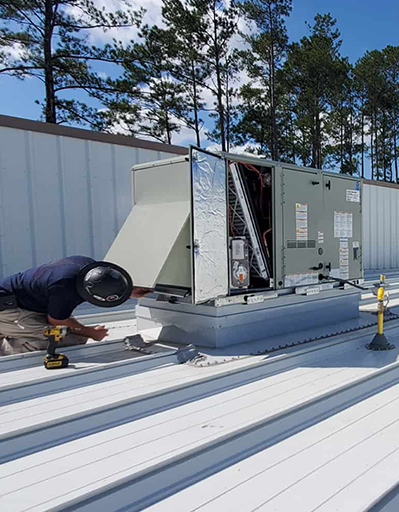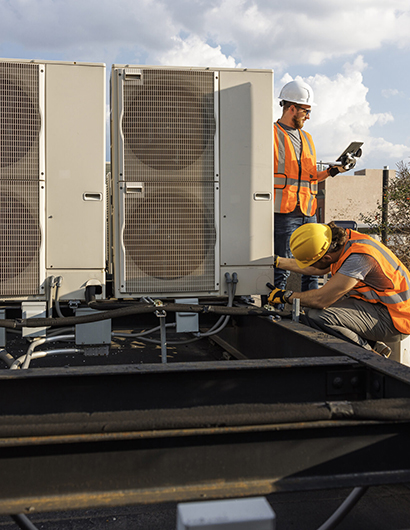Commercial HVAC Preventative Maintenance Contract in NYC

SERVICE DETAILS
Commercial HVAC Preventative Maintenance Contract in NYC
Welcome to Commercial HVAC Repair NYC Inc., your trusted partner in maintaining optimal indoor environments for commercial buildings across New York City. With our comprehensive HVAC preventative maintenance services, we ensure that your heating, ventilation, and air conditioning (HVAC) systems operate at peak efficiency, saving you both energy and money.
Why is preventative maintenance crucial for commercial HVAC systems in NYC?
According to the U.S. Department of Energy, organizations can achieve significant savings of 5-20% annually on energy bills simply by adhering to operations and maintenance best practices. At Commercial HVAC Repair NYC, we understand the importance of proactive maintenance in achieving these savings and maximizing the lifespan of your HVAC equipment.
Our team of experienced NATE and EPA-certified HVAC technicians specialize in all types of HVAC preventative maintenance services to meet the unique needs of your commercial space. From regular HVAC maintenance tasks to tune-ups and repairs, we ensure that your commercial HVAC systems operate smoothly year-round, regardless of the weather conditions outside.
By investing in our commercial HVAC preventative maintenance services, you can expect a multitude of benefits, including:
- Improved Performance: Regular maintenance ensures that your HVAC systems function optimally, providing consistent comfort for building occupants.
- Decreased Operations Costs: By identifying and addressing potential issues early on, we help you avoid costly HVAC repairs and minimize energy wastage, leading to lower operating expenses.
- Increased Equipment Service Life: Proper maintenance extends the lifespan of your HVAC equipment, reducing the need for premature replacements and saving you money in the long run.
- Reduced Risk of System Failure: Our proactive approach helps prevent unexpected breakdowns and downtime, ensuring uninterrupted operation of your HVAC systems when you need them most.
At Commercial HVAC Repair NYC Inc., we are committed to delivering top-quality commercial HVAC preventative maintenance services that exceed your expectations. Whether you own a small office building or a large commercial complex, you can trust us to keep your HVAC systems running efficiently, saving you time, money, and hassle.

Our comprehensive HVAC Inspection and Maintenance Checklist for Commercial Building HVAC Systems:
Air Distribution System:
- Inspect plenums, trunk ducts, fittings, branch ducts, boots, grilles, and diffusers for any damage or obstruction.
- Ensure proper airflow and distribution throughout the system.
Air Handlers:
- Check air filters for dirt buildup and replace if necessary.
- Inspect fan belts for wear and tension.
- Verify proper operation of frequency drives and control systems.
- Check fans and refrigerant levels.
Boilers:
- Inspect fuel filters and replace them if necessary.
- Perform chemical water testing and adjust water chemistry as needed.
- Check fuel pumps, controls, and burners for proper operation.
Air Cooled Chiller:
- Check controls, gearbox, and frequency drives.
- Verify refrigerant and oil levels.
- Inspect fluid flow and adjust as necessary.
Water Cooled Chiller:
- Ensure proper drive alignment.
- Check refrigerant and oil levels.
- Perform chemical water testing and adjust flow accordingly.
Evaporator Coils:
- Steam clean cooling coil.
- Inspect controls and metering devices.
- Check coil fins and tubing for damage or blockages.
Condensing Units:
- Steam clean condensing coil.
- Verify proper functioning of controls.
- Inspect fan belts, frequency drives, and fan blades.
- Check refrigerant levels and oil pressure.
Outdoor Air Heat Exchanger Systems:
- Inspect air filters, controls, fan belts, bearings, and heat exchangers.
PTACs/PTHPs Units:
- Verify fan blades, belts, air filters, refrigerant levels, P-Traps, drain pans, coils, and fins
Rooftop (RTU) Units:
- Check refrigerant levels, replace filters, and bearings, and replace fan belts, P-Traps, coils cleaning, and fan blades.
Terminal and Control Boxes:
- Verify fluid flow, air filters, fan blades, coils, filters, panels, and damper operation.
VRF Systems:
- Inspect controls, piping, indoor and outdoor units, refrigerant levels, and overall system operation.
Control Systems:
- Check air pressure, relative humidity, and temperature measurements.
- Ensure proper operation of time-of-day settings and backup batteries.
Cooling Towers and Evaporative Cooled Devices:
- Perform chemical water testing and adjust treatment as needed.
- Inspect blow-down control, fan operation, bearings, and pumps.
- Check dampers, nozzles, and exterior louvers for proper functioning.
Dehumidification and Humidification Devices:
- Verify UV lamp operation.
- Check fluid flow, level, and relative humidity.
- Inspect system traps, pumps, controls, strainer, and drain pans for biological growth.
Economizers:
- Inspect air filter for particulate accumulation.
- Check controls, dampers, seals, and low-limit settings.
Engines, Microturbines:
- Inspect controls, flex connections, and fuel pumps.
- Check exhaust systems, oil levels, and pressures.
Fans:
- Verify belt tension and alignment.
- Inspect fan blades, controls, ducts, bearings, and coil fins.
Fan-Coils, Hot Water, and Steam Unit Heaters:
- Check UV lamps and steam traps.
- Inspect filters, controls, P-Traps, belts, refrigerant/system temperatures, bearings, drain pans, and biological growth.
Furnaces, Combustion Unit Heaters:
- Verify fuel pressure and controls.
- Inspect fan belts, filters, dampers, safety devices, and coils.
HVAC Water Distribution Systems:
- Perform chemical water testing.
- Inspect controls, pumps, water flow, insulation, and strainers.
Pumps Motor:
- Inspect contactors, frequency drives, controls, flow, pressure, and bearings
Steam Distribution Systems:
- Inspect valves, perform chemical testing, and check traps, strainers, insulation, and safety devices.
Water-Source Heat Pumps:
- Ensure proper drive alignment, and inspect motor contactor, coils/fins, flow, P-Traps, and fan blades